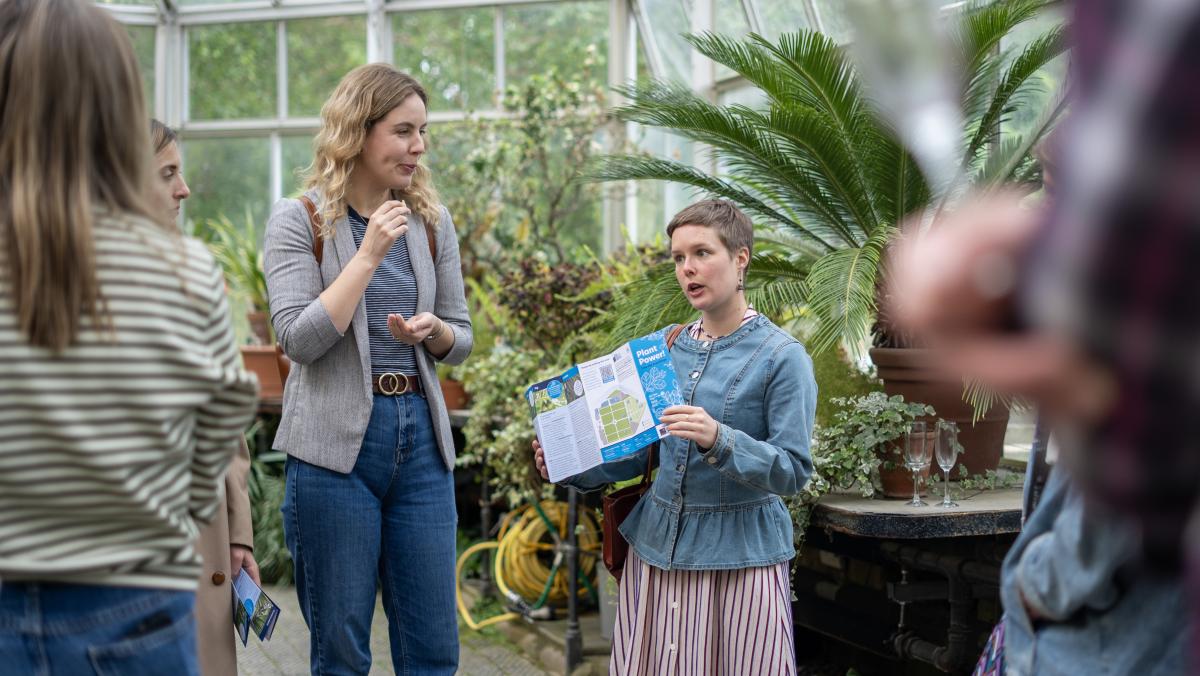
Dr Johnson in conversation with trail visitors.
Plants have been integral in healthcare for centuries. Before antibiotics were discovered, plants were commonly used to fight infections, and many drugs available today have been derived from natural products.
Plant Power! Stop the Superbugs is an interactive public engagement trail at the Oxford Botanic Garden that invites visitors to learn about antimicrobial resistance (AMR) and the natural world.
The trail has been designed by Dr Tess Johnson, senior ethics researcher based at the Ethox Centre and the Pandemic Sciences Institute at Oxford University. Dr Johnson’s work explores the complex moral and societal questions that arise in the context of global health threats, including pandemic response, disease surveillance, and the use of coercive public health measures that restrict people’s freedoms, like lockdowns, mask mandates, and travel bans.
Funded by Ineos Oxford Institute for antimicrobial research (IOI) and The Oxford Research Centre in the Humanities (TORCH) the trail combines ethics, history of medicine and biology to highlight how plants inspire the development of new medicines today. It also looks at how different cultures around the world have used plants throughout history, even if they didn’t know about their antimicrobial effects at the time.
Through this work, Dr Johnson encourages visitors to consider the ethical dimensions of AMR.
I want to support people to really think about how we have used plants for medicine and for drug innovation. It’s important that we all learn how our current actions might threaten or promote the health of people and environment in the future. And it’s surprising how much we can do as individuals, as communities, and through putting pressure on our governments, to protect ourselves and our planet!

Around 5,000 people have engaged with the trail so far. With support from the IOI and TORCH, the trail will now be a permanent feature of the Botanic Garden.
Featured Plants on the Trail:
- Japanese Bitter Orange (Citrus trifoliata)
- Ginkgo (Ginkgo biloba)
- Century Plant (Agave americana)
- Aloe vera
- Apple (Malus domestica)
- Rosemary (Salvia rosmarinus)
- Fig (Ficus carica)
- Lavender (Lavandula angustifolia)
Dr Tess Johnson, Senior ethics researcher based at the Ethox Centre and the Pandemic Sciences Institute at Oxford University said, "Visitors leave the garden with more than just a pleasant walk, they gain a deeper understanding of one of the most urgent health challenges of our time".
Volunteers enlisted by the Oxford Botanic Garden will collect feedback directly from visitors over the first month of the trail’s launch, and a feedback form available online will allow the researchers to monitor engagement and impact. The trail will support secondary school learning activities run by the Garden, too.
Want to talk about collaboration? Email Tess at: tess.johnson@ethox.ox.ac.uk
